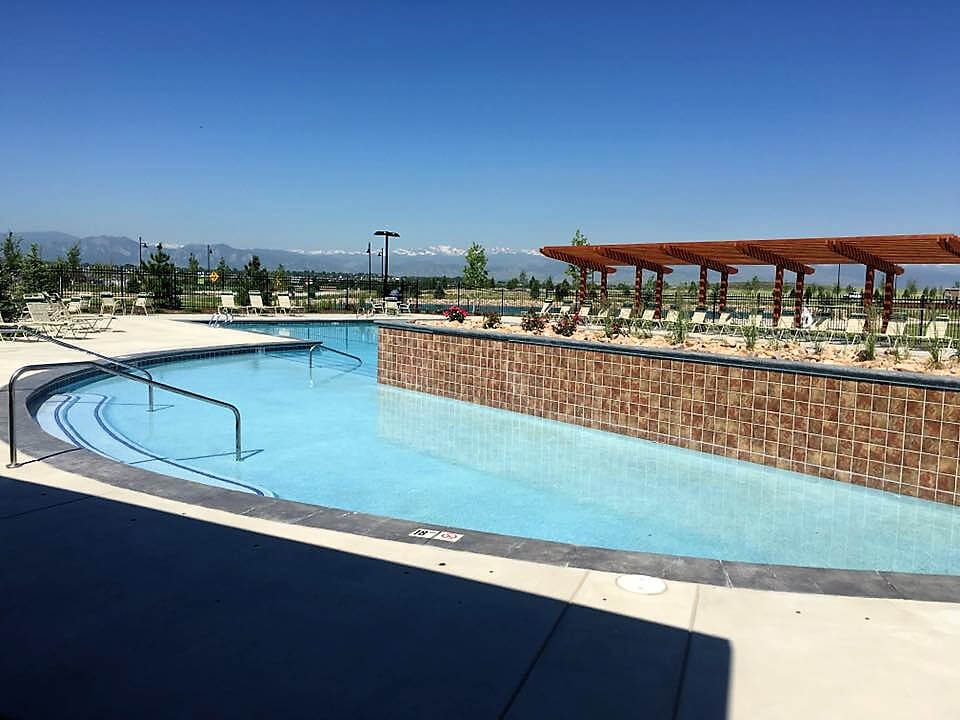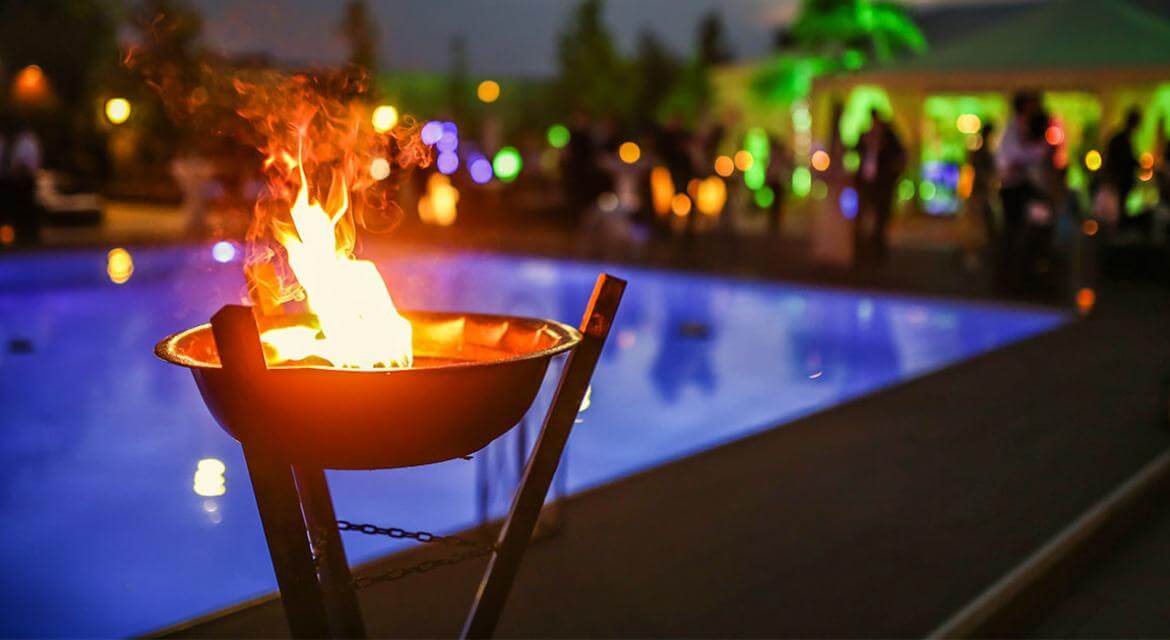An In-Depth Look Into Saltwater Pools in Littleton, CO
July 25, 2022by DigitalVueBuildPOOL AND SPA
What Are Saltwater Pools?
Saltwater pools are different than regular swimming pools. There are many differences between the two. Here are some of the major ones.
First off, saltwater pools use a salt chlorinator. Chlorine is added to the water, but not how most people think. Instead of adding liquid chlorine to the water, salt is added to the water. The salt causes the chlorine to form into tiny bubbles. These bubbles float around the pool and kill bacteria.
The most significant difference between a saltwater pool and a standard pool is the amount of salt used. Most pools use about four parts per thousand (ppt), while a saltwater pool needs closer to six ppt. The reason is simple: saltwater pools don’t require much chlorine to clean water. Saltwater pools use more salt to make up for the lower levels of chlorine needed.
Another big difference between saltwater and regular pools is how long they last. Saltwater pools typically last 25 to 30 years. Traditional pools usually last 20 to 25 years. Why does the salt help extend the life of the pool? Because the salt helps prevent algae growth. Algae grow quickly in regular pools but not in saltwater pools.
There are also costs involved with installing a saltwater pool versus a regular one. Some estimates say installation costs range anywhere from $15,000 to $50,000. On top of that, you’ll likely spend another $100 to $400 annually maintaining the pool.
What’s A Salt Chlorine Generator?
The salt chlorine generator is a device used to produce chlorine gas. Chlorine is a chemical compound with one oxygen atom bound to three hydrogen atoms. Its formula is Cl2.
In the United States, it is required that swimming pools contain a certain amount of chlorine to ensure public health and safety. To meet this requirement, most people buy a salt chlorine generator. A salt chlorine generator works like this: sodium chloride (commonly referred to as table salt) dissolves into the water in the pool.
This solution is pumped into a tank, where it sits overnight. During the night, the sodium chloride dissolves into the water and produces sodium hydroxide (NaOH). In the morning, the NaOH is pumped out of the tank and mixed with water. The mixture is sent through a reactor where the NaOH reacts with the water to make chlorine. The resulting chlorine goes into the pool, killing bacteria and making the water safe for swimmers.
The Pros and Cons of Saltwater Pools
There are many advantages to having a saltwater pool in your backyard. They’re easy to maintain and require almost no chemicals. But there are some downsides, too, including the fact that the water tends to smell slightly different than normal pool water and contains a lot less salt than conventional pools. In addition, saltwater pools tend to attract bugs, such as mosquitoes, because of the lack of chloramine in the water.
Saltwater pools are becoming increasingly popular due to their many benefits over conventional swimming pools. They are typically much quieter, cleaner, and healthier. But one drawback to saltwater pools is the high cost associated with purchasing and maintaining them.
However, there is a way to reduce the costs of owning a saltwater pool while still enjoying its benefits. One solution is to install an electrolytic chlorine generator in place of a traditional pool pump. These generators work like commercial pools, except you don’t need to buy chemicals to maintain them. Instead, you simply add salt to the water and let nature take care of the rest.
Producing chlorine via electrolysis requires electricity to pass through the saltwater, creating a current that causes the salt to break down into its constituent elements. Chlorine gas is formed during the reaction, and this gas is released into the pool water, where it kills harmful bacteria and viruses.
This method produces less chloramine than traditional methods, meaning the water will remain clean longer. And since no chemicals are used, the chlorine doesn’t smell. This makes saltwater pools ideal for families with children.
Less Pool Maintenance
Non-chlorine pools are generally considered easier to operate than chlorinated pools. Non-chlorine pools usually require fewer chemicals to keep the water balanced because the pool doesn’t contain chlorine to kill bacteria. In addition, most non-chlorine pools are self-contained systems, meaning they don’t rely on outside sources for their clean water supply.
This makes it much simpler to test the water quality and adjust the chemistry accordingly.
Most non-chlorine pools also don’t require regular shockings since they don’t produce enough chlorine to kill off algae or bacteria. However, some types of non-chlorine pools still require occasional shockings, especially during the summer when temperatures rise.
The biggest drawback to a non-chlorine pool is that you’ll likely need to buy a lot of salt to prevent the pool from getting too salty. Saltwater pools require approximately one pound of salt per 10,000 gallons of water. If you’re planning on keeping your pool open for several weeks each summer, you might consider purchasing a larger quantity.
Saltwater Pools Technician Required
While an experienced technician should appropriately handle repairs to the filter or pumps on a chlorinated pool, issues with the pool water chemistry can usually be corrected by testing the water and adjusting the proper sodium bicarbonate and calcium chloride levels. However, when dealing with a saltwater pool, many homeowners are unaware of how to test the water and what adjustments should be made.
The electrolytic chlorine generator is one of the most complex pieces of equipment used in a home. When purchasing a pool, you’ll want to ensure that it includes an automatic system that automatically adds enough chlorine into the pool water to keep it safe for swimming. However, if you’re planning on installing a saltwater pool, you’ll want to call an expert because the process requires special knowledge.
Reduce Chemical Storage
A saltwater pool uses electrolysis to split salt into sodium hydroxide and hydrogen gas. Sodium hydroxide creates the needed chlorine, while hydrogen gas helps prevent algae growth. Saltwater pools require no hazardous chemicals to maintain the chemical balance in the water.
With a chlorine pool, you must keep a supply of chlorine handy. You’ll also need to buy and store other chemicals such as bromine, stabilizers, clarifiers, and algaecides. But with a saltwater pool, there are no hazardous chemicals to store.
Salt and Corrosion
Salt is used to disinfect pools, but it has some drawbacks. Sodium chloride, or table salt, is one of the most common chemicals in swimming pools. It works by reacting with the bacteria and viruses in the water, killing them off while creating chlorine gas. This reaction causes corrosion, however, and over time, the sodium chloride corrodes many different types of metal, such as steel, aluminum, copper, brass, and iron.
This corrosion weakens the pool’s structure, leading to structural problems like sagging or buckling. In addition, the corrosion makes the pool look dirty, which could make people less likely to want to use it. Finally, the corrosion can cause rusted metal, which is even worse because it looks unsightly and might lead to dangerous situations for swimmers.
In particular, the corrosion affects ladder frames, diving boards, and other pool parts with exposed metal components. Contact your local pool maintenance professional immediately if you notice any corrosion. They can help you identify what type of corrosion is occurring and how best to prevent it.
Saltwater Pools are Less Harsh
The benefits of having a saltwater pool are many. But one of the most important reasons people install a saltwater pool is that it feels softer than traditional chlorine pools. This is mainly because saltwater pools don’t contain bromide or chloramine, which causes hard water to feel harsh on the skin. Bromides are chemicals added to swimming pool water to kill bacteria and algae, while chloramines are used to disinfect pool water.
Both bromides and chloramines react chemically with calcium ions in the water to form insoluble compounds called scale deposits. These scale deposits build up over time and eventually clog pipes and drains, causing problems like leaks and damage to pumps and filters. While saltwater pools require regular maintenance, including cleaning out debris, chemical treatment, and filtration, they’re far less likely to suffer from issues like those caused by chlorinated pools.
Are you ready to install a saltwater pool in your backyard? Contact your professional Littleton, CO pool builders at Wetworks Pool and Spa to get started! We have an A+ rating with the BBB and are family-owned and operated! Call us at 720-401-0004.



